Are you struggling grading student writing? It can be difficult to find time to grade all your students’ writing samples.
I think one of the problems is that teachers tend to grade too many writing samples. You end up grading every night and every weekend. I believe you can get writing grades without having to take home formal writing samples too often.
Let me show you how I have managed to handle grading student writing in my classroom.
First, my students always take an on-demand or pre-assessment at the beginning of each of my eight week units. I do grade this on-demand, but it does not go in the grade book. That would be unfair to my students since we haven’t completed any lessons yet.
I grade these because I can see where my class is at the start of the unit. I can see gaps right away. It also helps me to set conferencing groups, based on similar needs I discovered from the grading. I also give these on-demands back to my students so we can discuss the rubric together and my students can set goals for themselves. This will help get students invested in their writing.
I have a total of three big pieces that I grade each quarter and put in the grade book. I have my class complete two masterpieces with each unit. The first one is completed a little slower, while the second is done faster and considered a review. Both get graded and put into the grade book.
However, I sometimes grade the second orally. Have your students read their masterpiece out loud to you. They can do this in their conferencing groups, out loud to the whole class, or they can even record a video on a device for you to listen to at another time. You are grading for content only, but it is easier and faster because you are grading this at school.
The day after students finish their second masterpiece, they take their final on-demand assessment. This one gets a grade as well to give you a total of three writing grades per quarter.
Tips for Grading Student Writing: Masterpieces and On-Demands
1. Choose Your Rubric Wisely
On way to make grading student writing easier is to use very user-friendly rubrics. It should be simple to understand. In fact, it should be so simple that your students can understand it.
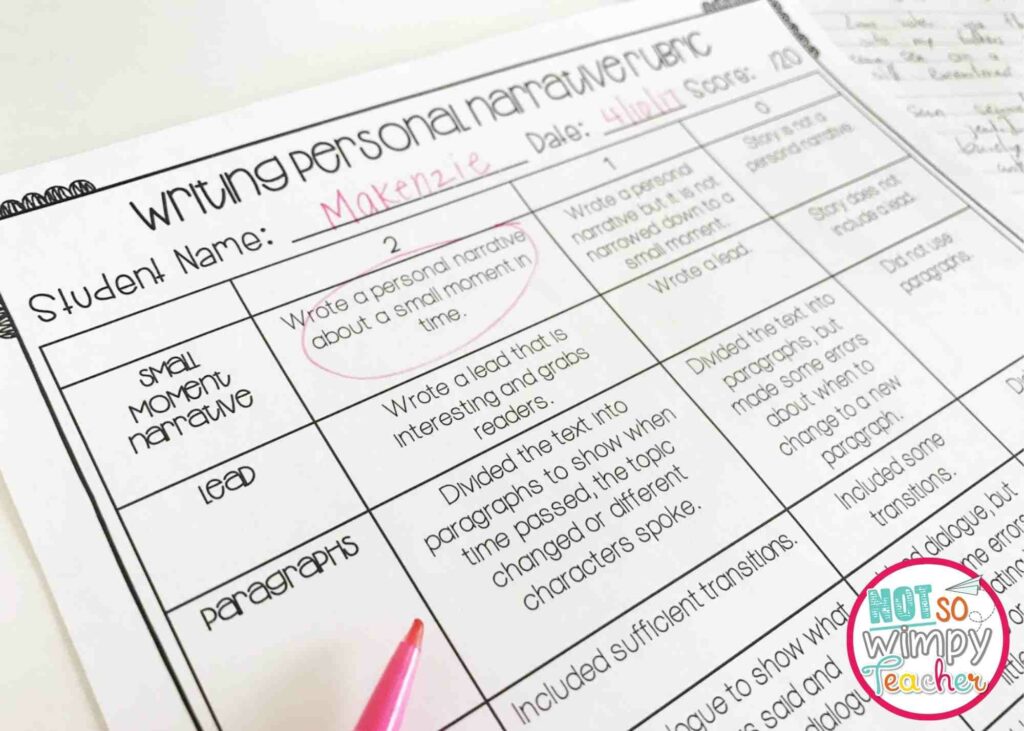
You can sign up for my free writing course and I’ll send you my three free writing rubrics for free.
2. Use Loose Paper
My students write all of their drafts and do all of their revising in their writing notebook. But when it comes time to grade, I don’t want to have to collect 25 notebooks. It takes way too much time to sift through the notebook looking for their piece and it’s just a pain to carry.
I always have my students write their on-demand writing samples on separate sheets of paper. I also have them do their published pieces on loose paper. This makes it so much easier for me to grade!
3. Make Stacks Based on Level
Before you begin grading student writing, consider eye-balling each paper and place these into stacks based on what looks like a low, average, or high paper. Then, as you grade, you aren’t bouncing all over between levels. It helps you get in a mindset for each level.
Of course you won’t always be right. A piece that looks like a hot mess can end up being full of excellent content. That’s alright! You’ll grade them all fairly.
4. Stop Writing Notes
Don’t spend time marking up your students’ writing. Instead of circling every word that is misspelled and every word that should have been capitalized, just highlight or circle the appropriate box on the rubric for errors.
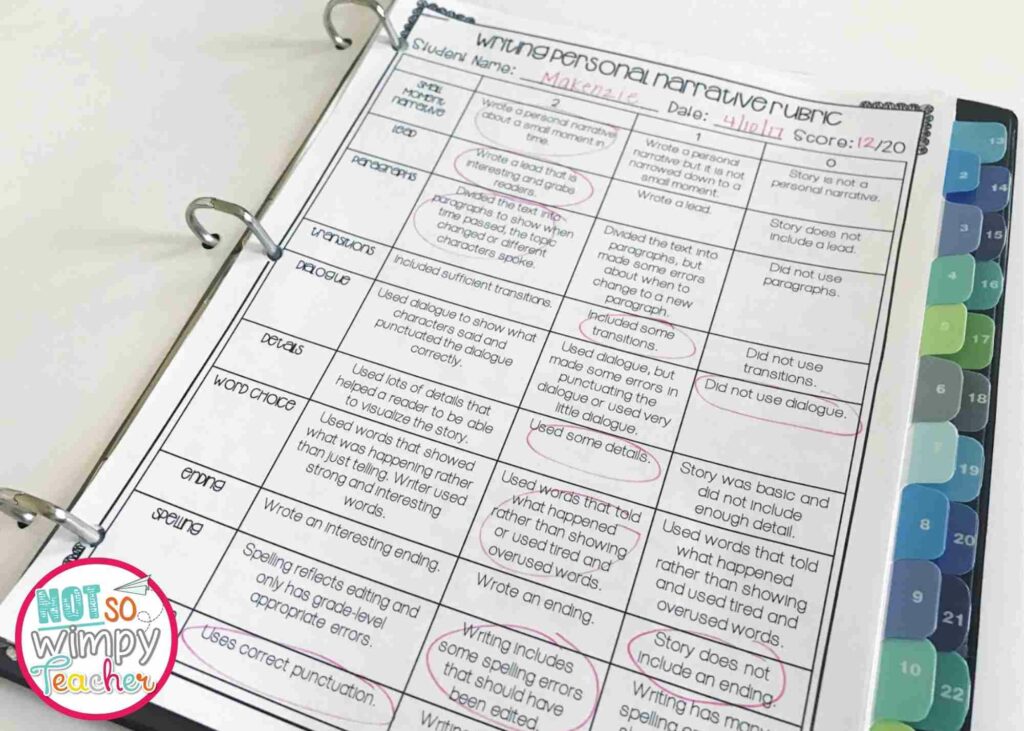
This will save you so much time when grading student writing. It’s much faster to circle the box on your rubric than it is to write notes explaining yourself to students. And honestly, all of those marks on their paper will discourage them!
5. Schedule Time to Grade
Give yourself time to grade at school, not home. Divide your stack into five days. For me, that meant I completed about five papers per day. I had to use my time wisely before and after school. I did this though because I needed to make sure I did not bring home my grading so that I could focus on my family.
You might not be the teacher who can do this, and that’s okay. I have teacher friends that couldn’t either and would focus one day on getting them all graded. This means papers come home that night, but at least it’s only one day.
Do what works best for you, but look at your calendar and block out time for grading student writing.
6. Don’t grade a writing sample every week!
I know teachers who give a different writing prompt or project every week. They are always knee deep in piles of writing that they need to grade. They get so far behind that they are passing back graded writing weeks after it was written and it isn’t helping students to grow as much as it could.
Instead, do fewer writing pieces. Give students longer to revise the one piece and make it into something they can be very proud of.
I know that you will need more than a few grades each quarter and so I will share some ideas for ways to get writing scores other than formal writing samples.
7. Grade a Small Task or Skill Instead of the Entire Paper
Another time-saving strategy for grading student writing is to only grade one small piece of their masterpiece. You can do this during writing conferences, or as you walk around the room during writing time.
For example, let’s say you taught leads and students had ample time practicing this skill. During small groups, have each student read you their lead. Decide on a point system; maybe 5 is a strong lead, 3 is attempted but not strong, and a 1 is no lead, etc. As students read their lead to you, take a quick grade for each lead. You can do this with many different skills.
Another way to use this strategy is that you could walk around and ask each student to give you their informational topic and three subtopics they chose. That can be a quick, simple grade for topics and subtopics. If you need grades every week, this is an easy solution.
Speaking and Listening Grades
The Common Core has speaking and listening standards built in, so don’t forget that writing time is a fantastic time to get scores. You can get speaking and listening grades during small group conferences, or if they present their writing to the whole class. If this is a grade you must have, don’t forget to take advantage of writing time to get a score.
Completion and Participation Grades
This is not something you can do every time you need a writing score. Also, your administration may not want you to do this. Mine allowed this, so I thought I’d share.
For completion grades, maybe you asked your class to go work on an ending during independent writing time. The next day, quickly walk around and see if they did what you asked and give them a score for completion. You don’t even have to read it! I would not give it as many points as a writing sample, and I would make a note in my grade book that it was a completion or participation grade. Some students struggle with content, and this is a great way to give them a little boost.
Participation grades are used similarly and can’t be used all of the time either. It can be a great way to boost student confidence though! Let’s say that you are working in a small group conference, and everyone is conversing nicely, participating, and sharing their work. Give them participation points for this! If you have students record notes on anchor charts or student printables, give them participation scores for this as well. Were your students in class, participating in pair-shares, on task during independent writing time, etc? These are easy ways to give participation points.
FREE Professional Development
Would you like more tips on how to make teaching writing easier?
You’re in luck! I’m doing a FREE writing workshop training next week:
🤩 3 Little-Known Secrets to EASILY Transform Your Students into Thriving & Excited Writers!🤩
In this training you’ll learn:
- The Godiva chocolate bar approach to teaching your students writing skills (in a way that’s manageable for students) 🍫
- How to keep all your students perfectly synchronized in the writing process (your reluctant writers and fast finishers will all be on the same page—finally!) 🙌
- My #1 way to instantly improve your writing lessons—that’s actually less work for you ✍️
But that’s not all! If you stay until the end, you’ll get:
- 36 FREE Reading Response Writing Menus! Yep. I said 36 menus! That’s one for every week of the school year! Each writing menu includes 9 different writing prompts to help your students practice responding to text dependent questions. Each menu includes questions for fiction and informational text. They can be used in reading groups, centers, for fast finishers, or for homework, and they work with any text! Plus, kids get to choose which prompts to answer, which makes them much more eager to write. 🙌
- A FREE one-hour professional development certificate 🙌
- A FREE training workbook to take notes during the presentation
You’ll walk away with practical, actionable tips that make it easier to teach writing. It doesn’t matter what writing curriculum your school uses. All my tips and strategies are designed to work with any curriculum.
Registration for the Not So Wimpy Writing Masterclass is currently closed. Be sure to sign up for the Waitlist so you will be the first to know when we open it again. Sign up now so you don’t miss out!

I hope that helps you save time when it comes to grading student writing. You can read more tips for giving students feedback about their writing here.
Have a Not So Wimpy Day,


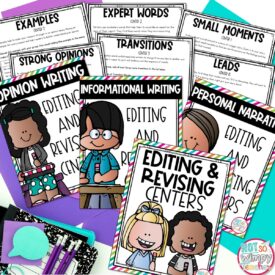
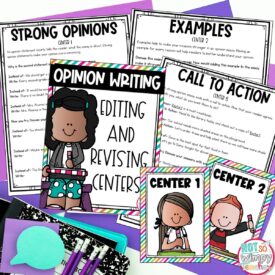





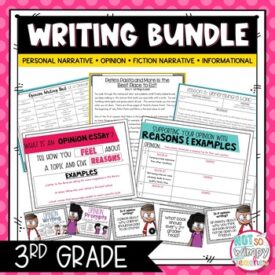
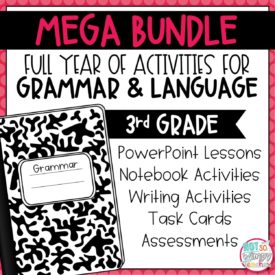


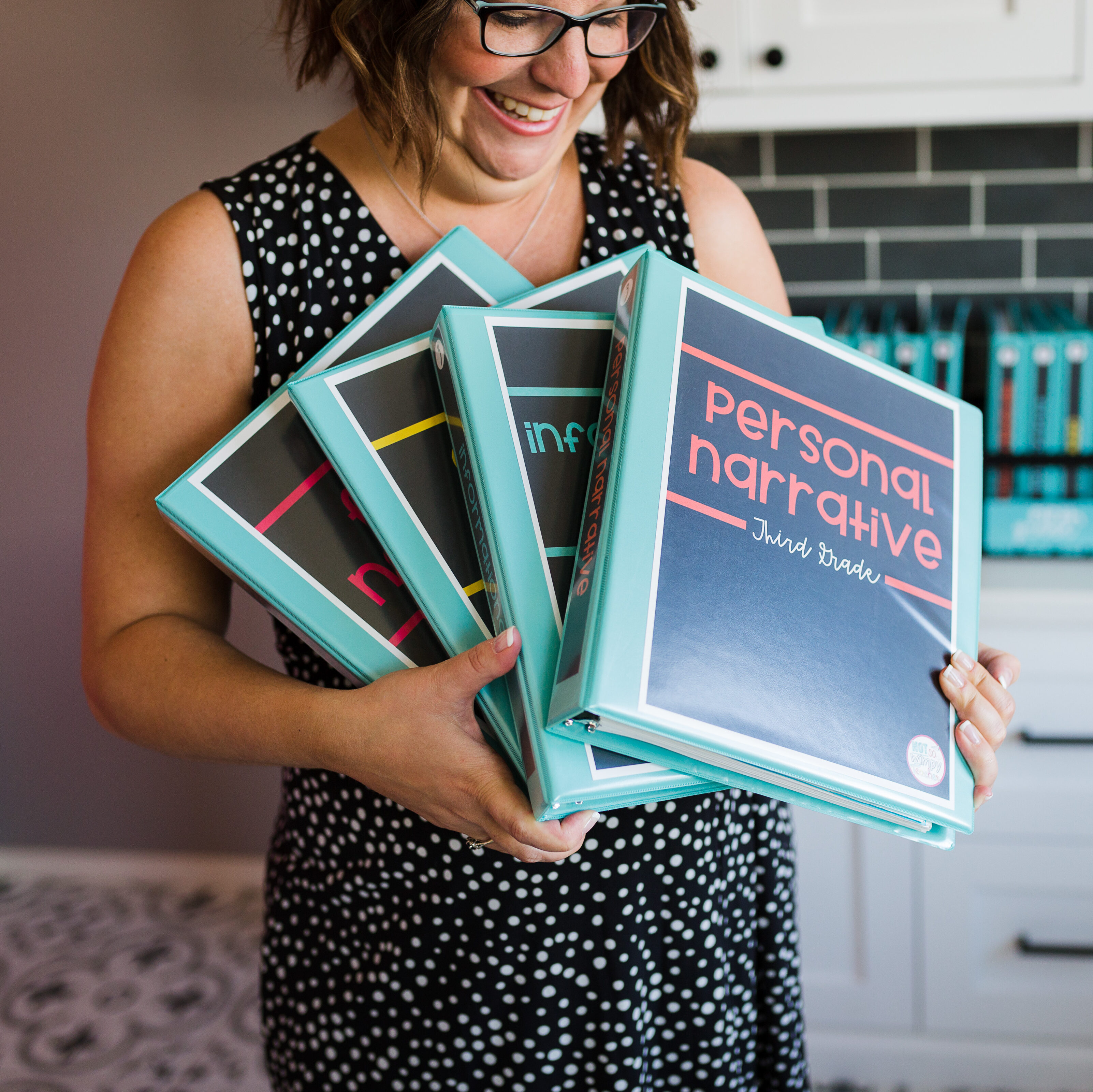






 Writing Test Prep Made Easy!
Writing Test Prep Made Easy!
Hi Jamie! This helped a lot. I am going to try doing the on demand writing at the beginning and then again at the end. Do you only do small groups or do you do one-on-one conferences as well. How many weeks into your unit do you grade your first masterpiece? How much time is in between your first and second masterpiece?
Thank you! You have great ideas!
In this article about grading students’ writing, you said that you only have three writing grades per quarter – two masterpieces and a final on demand assessment. Unfortunately this won’t work with my school district. We are REQUIRED to have two grades per subject EACH week including writing!!! Really!! I find myself trying to figure out what to assign so that I can take a grade on it. I feel like the assignment is usually something less than steller just so I can have a grade and that the “grades” don’t really reflect their true abilities. Do you have any good ideas for how I can accomplish my district’s unrealistic goal of two writing grades a week for 3rd grade when they are just learning how to write?
By the way, my district and state (Oklahoma) does not use Common Core so I am not allowed to use listening, speaking, completion and participation as the two weekly writing grades. The grades are supposed to come from legitimate assignments. So what possibly could I do to get two grades a week on students who have trouble even writing a sentence?
Could you take a grade on spelling or vocabulary sentences? It’s not ideal, but it might help you meet the requirements…
Great article! I have a question about spelling and punctuation grades. Do you grade them on the production piece after students have had a chance to edit (and therefore catch their mistakes) or do you look at rough drafts to see if they can spell correctly the first time? Thank you for the feedback!
We are struggling to know how to value the grade of an on demand narrative piece compared to the weight of the final piece of writing and then the grade of a final on demand piece of writing. Do you have a suggestion for how to value each piece of writing? Would you weigh them equally?
Hi Heather! First, I do not suggest grading the pre-assessment for your grade book. This is graded using a rubric, but is used to compare to your end of unit on-demand. I would suggest giving more weight to the published masterpieces than for daily tasks. For example, you may give a daily or weekly task 10 points, but the published masterpiece may be 100 points. I would consider a similar scale for the final assessment.